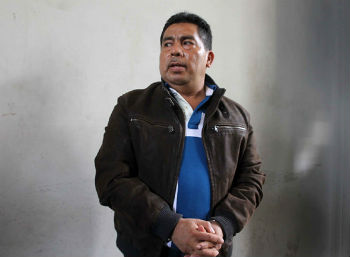Authorities in El Salvador say a former mayor who was arrested last year had ordered gang members to kill a municipal official, revealing the dangers of too much interaction between gangs and city hall.
The Salvadoran Attorney General’s Office arrested 21 members of the Barrio 18 gang for their involvement in the murder of René Antonio Díaz Orellana, a local councilman in the municipality of Apopa, reported La Prensa Gráfica.
Police investigators say three of the recently detained gang members attempted to kill Díaz Orellana in 2013 on orders from Apopa’s mayor at the time, Elías Hernández. When that attack was unsuccessful, Hernández instructed three other gang members to carry out the hit. The latter set of gang members were reportedly receiving benefits from the mayor.
Hernández was arrested in early June of last year for his alleged ties to the gang. Díaz Orellana was killed later that month.
According to the police, Hernández ordered Díaz Orellana’s murder because he failed to meet the gang’s demands for extortion payments and because the two had had political disputes.
The gang structure is also believed to be responsible for the killing of a police sergeant in October 2015, as well as several other crimes.
InSight Crime Analysis
The newest allegation against Hernández suggests his relationship with the gang, which initially appeared to have some altruistic elements, eventually became a vehicle to advance his personal interests and eliminate political enemies.
Relationships between mayors’ offices and gangs, while never an ideal scenario, have the potential to bring some much-needed relief to communities living in areas dominated by the gangs. According to the investigation that led to his arrest last year, Hernández sought a pact with the Barrio 18 in order to reduce the gang’s extortion of shop owners. The mayor also wanted Apopa to become a “sanctuary” city — meaning free of homicides — and for the gang members to turn in their arsenal of weapons, according to witness testimony.
SEE ALSO: El Salvador News and Profiles
But the gangs had demands of their own. In exchange for not extorting the store owners, the mayor imposed new taxes and sent some of the increased revenue to the gang, witnesses say. The mayor also allegedly allowed Barrio 18 members to use police cars to move drug shipments, and some gang members to collect government salaries.
While the quid pro quo between Hernández and the Barrio 18 was obviously of a criminal nature, there is a sizable gray area when it comes to officials engaging with gangs. Indeed, two separate videos released last year show El Salvador’s former security minister and current interior minister meeting with national gang leaders.
Given the gangs’ increasingly political outlook, the Apopa case is unlikely to be the last that forces the authorities to grapple with this issue.

